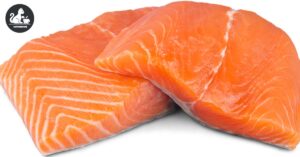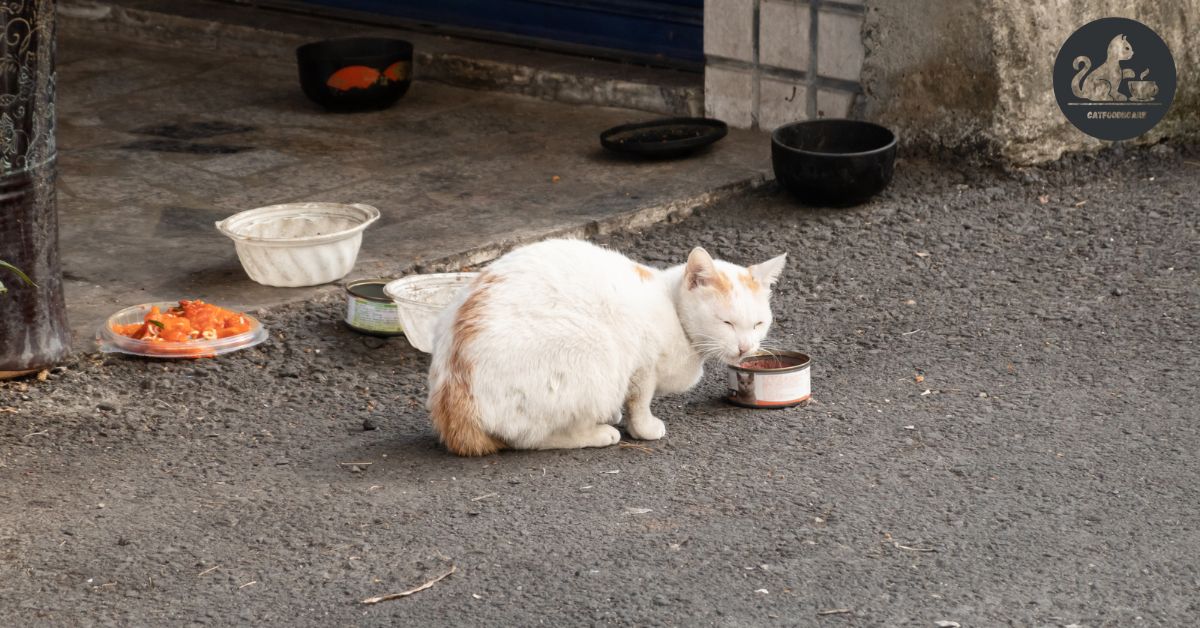If you’re a cat owner, you’ve probably wondered about the types of human foods that are safe for your feline friend. One common question is, “Can cats eat salmon?” The answer is yes, but there are some important considerations to keep in mind.
Salmon is an excellent source of protein and Omega-3 Fatty Acids, which play a crucial role in maintaining heart health and a shiny coat. However, it’s essential to serve it correctly to avoid potential health risks. Raw salmon, for instance, can lead to food poisoning due to harmful bacteria.
Canned salmon can be a healthier alternative, but it’s crucial to check for extra salt and other harmful ingredients. It’s also important to remember that while salmon can be a healthy treat, it should not replace a balanced cat food diet.
Some cats may also have fish allergies, so it’s essential to watch for signs of food allergies after feeding your cat salmon. Always consult with a veterinarian for advice about nutrition and potential health concerns.
While salmon can be a beneficial part of a cat’s diet, it should be served cooked, in moderation, and as an occasional treat rather than a complete food source.
What Do Veterinarians Say about Feeding Salmon to Cats?
Veterinarians often recommend salmon as a healthy treat for cats. It is an excellent source of protein and Omega-3 fatty acids, which play a crucial role in maintaining heart health and skin health in cats. However, vets also caution against feeding cats raw salmon or any other type of raw fish. Raw salmon can cause food poisoning and other health issues in cats due to bacteria and parasites.

Instead, vets suggest feeding cats cooked or canned salmon. Canned salmon and cooked salmon are safer because the cooking process kills harmful bacteria. But remember, even cooked or canned salmon should only be an occasional treat, not a complete food source.
Cats can also develop fish allergies, so watch for signs of food allergies such as itchy skin or hair loss. Vets also warn against feeding cats too much fish due to the potential health risks from heavy metals and mercury levels.
Lastly, vets recommend cat salmon oil supplements for the health benefits of Omega-3 fatty acids without the risks of raw fish. Always consult with a board-certified veterinarian for advice about nutrition and cat-safe foods.
Can Cats Eat Salmon?
Yes, cats can eat salmon. Salmon is an excellent source of protein and Omega-3 Fatty Acids, which are good for a cat’s heart health and skin health. However, it’s important to remember that raw salmon can cause food poisoning. So, it’s better to serve your cat cooked salmon.
Canned salmon can be a healthy treat for cats too, but be aware of the extra salt content. Too much salt can lead to health issues in cats. Also, some cats may have fish allergies. If your cat shows signs of food allergies after eating salmon, contact your regular veterinarian immediately.
Always remember, while salmon has many health benefits, it should not be a complete food source for your cat. Cats need a balanced diet, and commercial cat food is usually the best way to ensure they get all the essential vitamins and nutrients they need.
Salmon should be an occasional treat, not a daily food. Overfeeding salmon can lead to weight gain and other health problems. Always follow veterinary advice when changing your cat’s diet.
Nutritional Benefits of Salmon for Cats?
Salmon is a healthy treat for cats, offering several nutritional benefits.
- It’s an excellent source of protein, which plays a crucial role in maintaining your cat’s overall health.
- Salmon is rich in Omega-3 Fatty Acids, which can improve coat health and reduce inflammation.
- It also contains essential vitamins like Vitamin B12 and Vitamin B6, which are vital for a cat’s nervous system.
- Canned salmon can be a convenient choice, but ensure it’s low in salt and doesn’t contain any harmful ingredients.
- Cooked salmon is safer than raw salmon for cats. Raw fish can cause food poisoning and other health issues.
- While salmon can be a tasty treat, it shouldn’t replace a balanced cat food diet. It’s best served as an occasional treat.
- Be aware that some cats may have fish allergies. Watch for signs like itchy skin or hair loss after feeding salmon.
- Always consult your veterinary advice before introducing new foods into your cat’s diet.
Remember, moderation is key when feeding human foods to cats. Too much salmon can lead to weight gain and other health problems.
Potential Health Risks of Feeding Salmon to Cats?
- Feeding your cat salmon can pose potential health risks. While salmon is a great source of protein and Omega-3 fatty acids, it’s important to serve it properly to avoid issues.
- Raw salmon, like other types of raw fish, can carry parasites and bacteria that can cause food poisoning. Always serve your cat cooked salmon to kill off these harmful organisms.
- Canned salmon can be high in sodium, which is not good for your cat’s heart health. Too much salt can lead to health issues like high blood pressure and heart disease.
- Some cats might be allergic to fish. Signs of fish allergies can include itching, hair loss, and digestive issues. If you notice these symptoms after feeding your cat salmon, stop immediately and consult a vet.
- Mercury levels in fish can be harmful to cats. High levels of mercury can lead to mercury poisoning, which can damage the nervous system.
- Salmon should be an occasional treat, not a complete food source. It lacks certain essential vitamins like Vitamin B12 and arachidonic acid that cats need, which are found in commercial cat food.
- Lastly, avoid feeding your cat salmon skin. It’s often high in fat and can lead to weight gain and other health issues.
How to Feed Salmon to Cats Safely?
Feeding your feline friend salmon can be a healthy treat, but it’s important to do it safely. Salmon is an excellent source of protein and Omega-3 Fatty Acids, which play a crucial role in heart health and coat condition. However, there are potential health risks associated with feeding cats raw fish, including food poisoning and mercury poisoning. Here’s a step-by-step guide on how to safely feed salmon to cats.
Step 1: Choose the Right Salmon
Not all types of fish are safe for cats. Canned salmon and cooked salmon are usually the safest options. Avoid raw salmon as it can contain parasites harmful to your cat’s digestive tract. Also, be mindful of the mercury levels in the salmon. High levels of mercury can lead to mercury poisoning.
Step 2: Prepare the Salmon
If you’re using fresh salmon, make sure it’s thoroughly cooked to kill any harmful bacteria or parasites. Avoid adding extra salt or other seasonings, as these can be harmful to cats. If you’re using canned salmon, choose a product with low salt content.
Step 3: Remove the Skin and Bones
Salmon skin can be hard for cats to digest and may cause health issues. Similarly, small bones can pose a choking hazard. Always remove the skin and bones before feeding salmon to your cat.
Step 4: Serve in Moderation
Salmon should be an occasional treat, not a complete food source. Too much salmon can lead to weight gain and other health problems. A small piece of salmon can be a healthy snack, but it shouldn’t replace a balanced cat food diet.
Step 5: Monitor Your Cat
Watch for signs of food allergies, such as itchy skin or hair loss. If your cat shows any adverse reactions, stop feeding them salmon and consult your regular veterinarian.
Remember, while salmon has many health benefits, it’s not a substitute for commercial cat food, which is specially formulated to provide a balanced diet. Always consult with a board-certified veterinarian or a pet insurance provider for advice about nutrition and cat-safe human foods.
Feeding salmon to your cat in moderation can be a tasty treat and a good source of Omega-3 fatty acids and protein. However, it’s important to choose the right type of salmon, prepare it properly, and serve it in moderation to ensure your feline companion enjoys the benefits of salmon without the potential health risks.
Conclusion
In wrapping up, cats can eat salmon, but it should be served in moderation. Salmon is a rich source of protein and Omega-3 Fatty Acids, which are beneficial for your cat’s health. However, it’s crucial to avoid raw salmon due to potential health risks like food poisoning. Always opt for cooked salmon or canned salmon without any extra salt or harmful ingredients. Remember, while salmon can be a tasty treat for your feline friend, it should not replace a balanced cat food diet. Always consult with a veterinary for advice on your cat’s diet and to understand any potential food allergies.
Recent Posts
10 Best Canned Cat Foods of 2024, According to Veterinarians
Inside this expert-backed list of 2024's top wet cat foods, discover why veterinarians trust these brands for optimal feline nutrition.
Grab expert insights into the top-rated wet cat foods that veterinarians trust most, and discover why some brands outshine...

